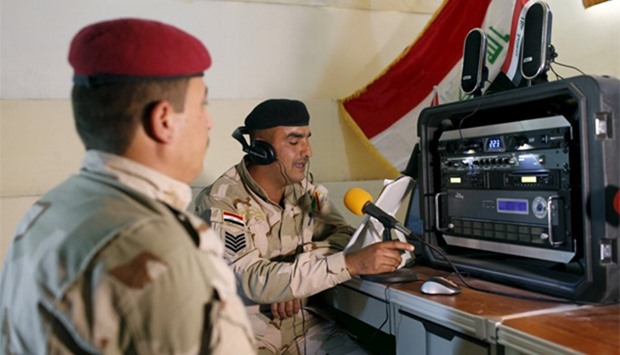The dispute centres around Turkish troops deployed near Mosul, a presence that Iraqi Prime Minister Haider al-Abadi has strongly opposed and said he fears could lead to ‘regional war.’
Ankara called in the Iraqi ambassador while Baghdad said it had decided to summon the Turkish envoy following bitter verbal exchanges, the two foreign ministries said.
The Turkish parliament at the weekend extended by one year a government mandate allowing its troops to deploy on both Iraqi and Syrian territory.
The Iraqi parliament condemned the decision, calling for the withdrawal of the Turkish troops already there.
‘We do not want to enter a regional conflict,’ Abadi told a news conference in Baghdad, saying he fears ‘the Turkish adventure will turn into a regional war.’
Turkey's President Recep Tayyip Erdogan has warned of possible sectarian consequences arising from the Mosul operation, prompting the Iraqi foreign ministry to summon the Turkish ambassador over ‘provocative Turkish statements’.
Mosul, Iraq's second city, was seized by the Islamic State (IS) group in 2014 after multiple Iraqi divisions collapsed in the face of a jihadist assault.
But Baghdad is now planning, with help from a US-led coalition, a major operation to retake the city, which had a population of two million before the IS invasion.
Ankara has made clear it does not want to be left on the sidelines.
- Turks 'not occupying force' -
Turkish Foreign Minister Mevlut Cavusoglu accused the Iraqi government of not acting in good faith when it condemned Ankara's extended mandate during a press conference in Ankara.
Ankara has an undisclosed number of troops in the Bashiqa camp in northern Iraq training Iraqi fighters who hope to take part in the battle to recapture Mosul.
Cavusoglu said the Iraqi government knew about the camp's establishment, adding that officials from Baghdad had even ‘visited the camp and given financial support’ in the past.
Turkish Deputy Prime Minister Numan Kurtulmus said the troops were not planning to be an ‘occupying force’.
‘Where was the Iraqi government when Daesh (IS) captured Mosul in a day... We have difficulty understanding this decision (of the Iraqi parliament),’ he said.
Abadi has repeatedly expressed his opposition to the presence of Turkish troops on Iraqi soil and demanded that they be withdrawn.
But the forces are in territory controlled by the autonomous region of Iraqi Kurdistan, whose government has close relations with Ankara.
Anthony Skinner, head of political risk at Verisk Maplecroft consultancy, said that military conflict with Turkey was the ‘last thing (Iraq) can afford’.
‘This, however, is not to preclude the possibility that diplomatic measures will be taken by Baghdad against Ankara,’ he told AFP.
- 'Impossible balancing act' -
Erdogan suggested at the weekend that the liberation of Mosul had to be conducted by those with ethnic and religious ties to the city, objecting to the use of Shia militiamen or anti-Ankara Kurdish forces.
Turkey is an overwhelmingly Sunni Muslim country with increasingly close ties to Sunni Muslim kingpin Saudi Arabia.
As he did with regard to Syria, Erdogan indicated he was particularly troubled by any use of fighters linked to the Kurdistan Workers' Party (PKK), which has waged a 32-year insurgency inside Turkey and whose paramilitary headquarters are in northern Iraq.
‘The game played by Shia militias and members of the terrorist organisation linked to the PKK -- in complete contradiction of the region's sectarian and ethnic structure, its cultural sensitivities -- must be disrupted,’ he said.
Skinner said the US administration has a ‘nigh impossible balancing act’ between keeping Ankara on board as an ally in Iraq and Syria and giving ‘qualified support’ to a Kurdish militia seen by Turkey as a terrorist group.
Turkish Defence Minister Fikri Isik has also warned that an assault on Mosul could cause an exodus of up to a million Iraqis and had to be contained within Iraq.
‘Our allies need to carefully consider how there could be up to one million refugees caused by (any) Mosul operation. This migration wave must be resolved within Iraqi territory,’ he said on Tuesday, quoted by Dogan news agency.
He said if the wave was not limited to Iraq, it would be a ‘large burden’ for Turkey that would also affect Europe.
Ankara says it is already home to more than three million refugees, most of whom are from Syria fleeing violence during the over five-year conflict, but some 300,000 of whom are from Iraq.

